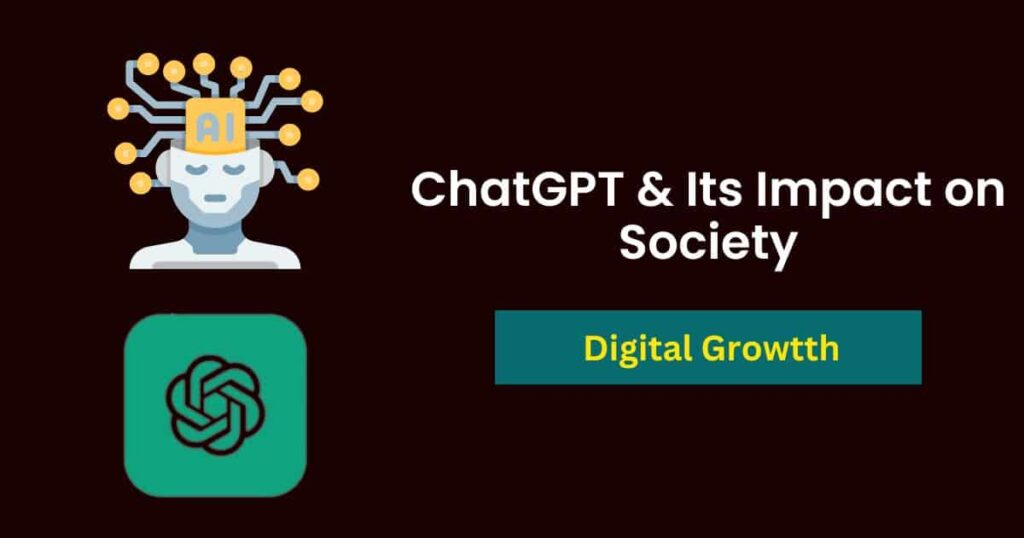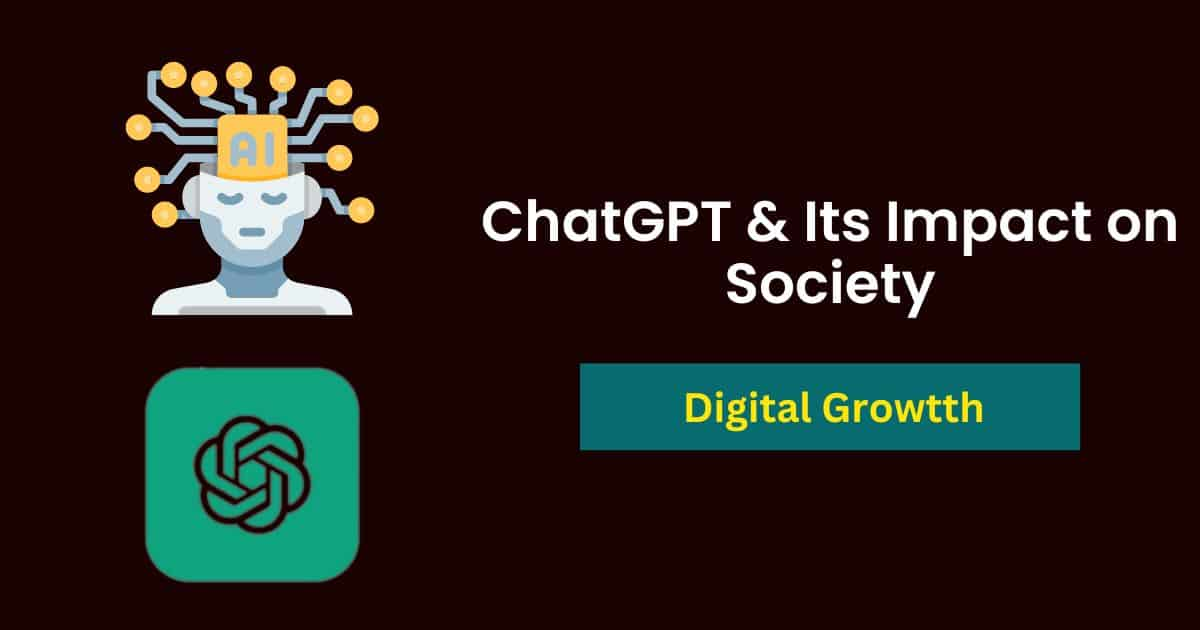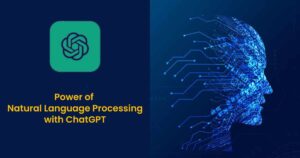The development and advancement of ChatGPT, an advanced language model powered by artificial intelligence, have had a significant ChatGPT Impact on society. As we delve into the Impact of ChatGPT on Society, it becomes evident that its effects are far-reaching and multifaceted. From transforming the way we communicate to revolutionizing various industries, ChatGPT has left an indelible mark on society.
The impact of ChatGPT on society is profound. This AI-powered tool has revolutionized the way we interact and engage with technology. By understanding and responding to human language in a conversational manner, ChatGPT has enhanced communication channels, providing individuals with new opportunities to connect, seek information, and express themselves. It has opened up avenues for seamless interaction, making technology more accessible and user-friendly.
In exploring how ChatGPT affects society, we witness its influence across different sectors. In the field of customer service, for instance, businesses have employed ChatGPT-powered chatbots to provide instant and personalized assistance to customers. This has streamlined support systems, improved response times, and enhanced customer experiences. Additionally, in healthcare, ChatGPT has contributed to the development of virtual assistants capable of providing medical advice and support, extending access to healthcare resources in remote areas.
The effects of ChatGPT on society extend beyond specific industries, touching on broader social dynamics. With the growing integration of AI technology, concerns regarding privacy, data security, and ethical considerations have emerged. As ChatGPT becomes more sophisticated in its ability to generate human-like responses, there is a need for careful evaluation and regulation to ensure responsible and ethical usage. Society must grapple with questions surrounding algorithmic biases, transparency, and accountability to mitigate any potential negative consequences.
Examining the social impact of ChatGPT, we observe its influence on education and information dissemination. Students and researchers can tap into vast knowledge resources, engage in interactive learning experiences, and receive personalized guidance through AI-powered educational platforms. ChatGPT’s ability to generate coherent and relevant responses aids in information retrieval and synthesis, empowering individuals to access knowledge and explore new ideas.
As we navigate the evolving landscape shaped by ChatGPT, it is essential to strike a balance between harnessing its capabilities for societal benefit while addressing potential challenges. Continued research, ethical considerations, and open dialogue are crucial in shaping the responsible integration of ChatGPT into our society. By leveraging its potential wisely, we can harness the transformative power of ChatGPT to create a more connected, efficient, and inclusive future.

ChatGPT: The Future of Communication and AI
The development of advanced chatbots powered by natural language processing (NLP) and artificial intelligence (AI) has the potential to revolutionize the way we communicate and interact with technology. One such chatbot is ChatGPT, which is based on the state-of-the-art GPT-3 language model developed by OpenAI. You can read more about What is ChatGPT and How it Works ?
ChatGPT is capable of generating human-like text, making it ideal for tasks such as answering questions, generating responses in a conversation, and more. This has led to a growing number of businesses integrating ChatGPT into their websites and apps, providing users with quick and accurate answers to their questions and improving the overall user experience.
ChatGPT Impact on Society
However, the impact of ChatGPT on Society goes far beyond just customer service. Its ability to understand and respond to human language has the potential to revolutionize a wide range of industries, from education and healthcare to finance and retail.
One area where ChatGPT can have a major impact of ChatGPT on Society is in customer service. By automating routine tasks and handling simple queries, ChatGPT can free up human support staff to focus on more complex issues that require their expertise. This can result in more efficient and effective support for customers, as well as cost savings for businesses.
ChatGPT can also be used to provide instant translation services, allowing people to communicate with each other regardless of language barriers. This has the potential to break down barriers and bring people closer together, fostering greater understanding and empathy across cultures.

ChatGPT Impact on Education sector
In the education sector, ChatGPT can be used to provide students with instant feedback and support as they learn. This can help improve the learning experience, making it more engaging and interactive for students. For example, students can ask ChatGPT questions about a particular topic or assignment, and receive instant answers and guidance. This can help students learn at their own pace, without the need for a human teacher to be present at all times.
ChatGPT Impacts on healthcare sector
In healthcare, ChatGPT can be used to provide patients with instant answers to their questions and connect them with healthcare professionals. For example, patients can ask ChatGPT about their symptoms, and receive instant advice on whether they need to see a doctor or not. This can help reduce wait times and improve the overall healthcare experience for patients.
ChatGPT Impacts on finance sector
In finance, ChatGPT can be used to provide customers with instant answers to their questions and help them manage their accounts. For example, customers can ask ChatGPT about their account balances, transactions, and more, and receive instant answers. This can help improve the overall banking experience for customers, and reduce the need for human support staff.
ChatGPT Impacts on Retail sector
In retail, ChatGPT can be used to provide customers with instant answers to their questions and help them find products they’re looking for. For example, customers can ask ChatGPT about product specifications, availability, and more, and receive instant answers. This can help improve the overall shopping experience for customers, and reduce the need for human support staff.
ChatGPT Impact on Journalism sector
Another area where ChatGPT can have a major impact is in journalism and content creation. Its ability to generate high-quality text that is coherent and semantically consistent can help journalists and content creators save time and effort in writing articles and content. ChatGPT can be used to generate articles and content on a wide range of topics, from news and politics to sports and entertainment.
Overall, the impact of ChatGPT on society is significant, as it has the potential to improve the way we communicate and interact with technology. Whether it’s providing instant translation services, automating routine tasks, or improving the learning experience, ChatGPT is helping to shape the future of communication and technology.
However, alongside their benefits, it is crucial to acknowledge the potential misuses and ethical concerns associated with these technologies. In this blog post, we will explore some pressing issues related to the impact of ChatGPT on society, focusing on areas such as scams and fraud, political manipulation, cyberbullying, job displacement, and ethical concerns regarding psychological profiling.
Unveiling the Impact of ChatGPT on Society: Addressing Ethical Concerns and Misuses
Misuse of Chatbots in Scams and Fraud:
The rapid development of AI-powered chatbots has unfortunately provided an avenue for criminals to exploit innocent individuals. Scammers can utilize chatbots to impersonate individuals or organizations, tricking people into divulging sensitive information or making financial transactions. Various reported incidents have shed light on this concerning misuse, underscoring the importance of vigilance and awareness when interacting with chatbots.
Misuse of Chatbots for Political Manipulation:
AI-powered chatbots have been implicated in instances of political manipulation, where fake social media profiles are created to propagate misinformation and propaganda. These chatbots can spread biased narratives, influence public opinion, and undermine the democratic process. Recognizing this issue is crucial for preserving the integrity of political discourse and promoting informed decision-making.
Misuse of Chatbots for Cyberbullying:
The potential for AI-powered chatbots to perpetuate cyberbullying is a growing concern. Chatbots can be programmed to harass individuals online, disseminating hate speech or offensive messages. This poses a significant threat to mental health, particularly for vulnerable groups like children and teenagers. Ensuring the responsible development and deployment of chatbots is essential to mitigate this form of digital abuse.
Misuse of Chatbots in Job Displacement:
While chatbots like ChatGPT offer benefits such as increased efficiency and cost reduction, they can also lead to job displacement and unemployment for human workers. Roles traditionally fulfilled by human customer service representatives or salespeople may be replaced by chatbots, resulting in potential job losses. Understanding the broader impact of automation and AI technologies on the workforce is crucial for implementing effective strategies to address this issue.
Ethical Concerns with ChatGPT’s Use in Psychological Profiling:
The capabilities of AI-powered chatbots, including ChatGPT, raise ethical concerns when it comes to psychological profiling. By analyzing language patterns and responses, chatbots can potentially extract information about individuals’ emotions, values, and interests. This data could be exploited for targeted advertising or even political manipulation. Upholding privacy and data protection standards, as well as ensuring transparency and informed consent, are vital in mitigating the risks associated with psychological profiling.
Conclusion on ChatGPT and its Impact on Society
In conclusion, ChatGPT is a powerful tool that can transform the way we live and work. Its ability to understand and respond to human language makes it ideal for a wide range of applications, from customer service to education and healthcare.
However, as with any new technology, there are also concerns about the potential impact of ChatGPT on society. For example, some people are worried about the potential for job losses as a result of automation. Others are concerned about the ethical implications of AI, including issues such as privacy and the potential for AI systems to be used for malicious purposes.
Despite these concerns, the potential benefits of ChatGPT far outweigh the risks, and its impact of ChatGPT on society is only set to grow in the coming years. As AI continues to evolve, ChatGPT will play an increasingly important role in shaping the future of communication and technology.
In the end, it’s up to us as a society to determine how we use ChatGPT and other AI technologies. If we use them responsibly and for the betterment of humanity, the possibilities are endless. Whether it’s improving the way we communicate, providing access to education and healthcare, or transforming the way we live and work, ChatGPT has the potential to make a positive impact on Society.
FAQ’s – Frequently Asked Question
What are the drawbacks of ChatGPT?
ChatGPT, like any other language model, has some limitations and drawbacks. Here are some of the most notable ones:
Lack of context: ChatGPT is trained on a large corpus of text, but it doesn’t have access to external information or context. This means that it can struggle to understand the context of a conversation or answer questions that require background knowledge.
Bias: ChatGPT has been trained on the internet, which is a biased source of information. As a result, it may generate responses that reflect those biases, such as gender or racial stereotypes.
Inaccurate or misleading information: Since ChatGPT has been trained on text from the internet, it may contain inaccurate or misleading information. It’s important to verify information generated by the model before using it.
Repetition: Because ChatGPT is trained to generate text that is similar to what it has seen in its training data, it may sometimes repeat information or generate generic, unoriginal responses.
Lack of common sense: ChatGPT doesn’t have a general understanding of the world, and it may struggle to answer questions that require common sense reasoning.
Safety concerns: ChatGPT is a language model, so it can generate text that is offensive, harmful, or otherwise unsafe. It’s important to use the model responsibly and filter out potentially problematic text.
Overall, it’s important to understand the limitations of ChatGPT and use it in conjunction with other sources of information to get the most accurate and relevant answers.
Can I use ChatGPT for my business?
Yes, you can use ChatGPT for your business. In fact, there are several ways that ChatGPT can be applied to various industries, such as:
Customer service: You can use ChatGPT to provide 24/7 support to your customers by generating responses to common questions. This can help improve customer satisfaction and reduce support workload.
Content generation: ChatGPT can be used to generate articles, blog posts, product descriptions, and other types of written content, saving you time and resources.
Sales and marketing: You can use ChatGPT to generate personalised, data-driven marketing and sales content, such as email campaigns, social media posts, and more.
Research and analysis: ChatGPT can help you perform research and analysis by generating reports, summarising large amounts of text, and more.
Chatbots: You can use ChatGPT to build conversational chatbots for various use cases, such as customer support, e-commerce, and more.
Keep in mind that while ChatGPT can be a useful tool for businesses, it’s important to understand its limitations and use it in conjunction with other sources of information to ensure the accuracy and relevance of the results.
Can I use ChatGPT for work?
Yes, you can use ChatGPT for work. There are several ways in which ChatGPT can be applied in a professional setting, including:
Content creation: ChatGPT can be used to generate written content, such as reports, emails, and presentations. This can save time and improve efficiency for tasks that require large amounts of written text.
Research and analysis: ChatGPT can help with research and analysis by generating summaries, extracting key information, and more.
Customer support: You can use ChatGPT to provide quick and accurate responses to common customer inquiries, improving customer satisfaction and reducing support workload.
Knowledge management: You can use ChatGPT to generate and organize information on various topics, making it easier to access and use that information in the future.
Chatbots: You can use ChatGPT to build conversational chatbots for various use cases, such as customer support, internal communications, and more.
Does ChatGPT have internet access?
No, ChatGPT does not have direct access to the internet. It is an offline model that has been pre-trained on a large corpus of text data, but it doesn’t have the ability to search or access new information in real-time.
When you input a prompt or question to ChatGPT, it generates a response based on the patterns and relationships it learned from its training data. This means that ChatGPT’s responses are limited to the information it was exposed to during training, and it can struggle to provide accurate information for topics that are outside of its training data or require real-time access to external information.
If you need information that is not included in ChatGPT’s training data, it’s a good idea to verify the information it generates by using additional sources, such as a search engine or trusted reference material.
What are the advantages of ChatGPT?
ChatGPT is a large language model developed by OpenAI that has several advantages, including:
Natural language understanding: ChatGPT has been trained on a massive amount of text data, which allows it to understand and generate human-like text. This makes it a powerful tool for tasks such as language translation, question answering, and content generation.
Speed and efficiency: ChatGPT can generate text very quickly, making it a useful tool for tasks that require large amounts of written content, such as reports and presentations. This can save time and improve efficiency compared to manual text generation.
Versatility: ChatGPT can be used for a wide range of tasks, including customer support, content generation, research and analysis, and more. This makes it a useful tool for businesses and organizations of all types.
Personalization: ChatGPT can be fine-tuned to generate personalized text based on specific input data, such as customer information or company-specific data. This allows for more accurate and relevant results for specific use cases.
Cost-effectiveness: Compared to traditional language processing tools, ChatGPT is relatively low-cost and easy to access, making it a cost-effective option for many organizations.
Overall, ChatGPT has the potential to greatly improve efficiency, accuracy, and personalization in various industries, making it a valuable tool for businesses and organizations.



